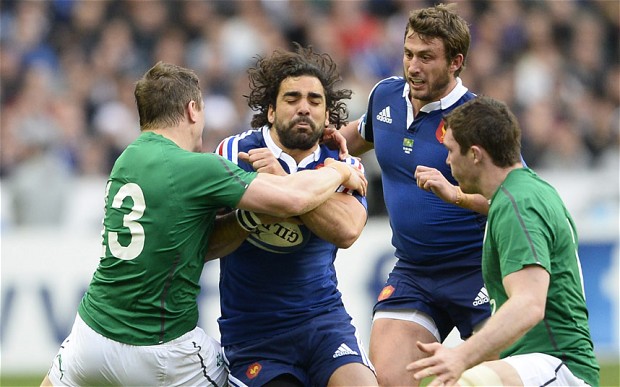
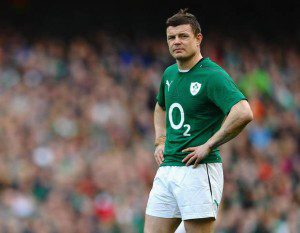
CASTRES, FRANCE – It was a breathless, desperate, Irish backs-to-the-wall nail-biter of an end to the Six Nations.
The French, the frustrating, mercurial, brazen, brilliant French, saved their very best till the very end. And the long final “Super Saturday” of the 2014 tournament was blessed with the perfect finale it had been crying out for.
In the end, though, Ireland did it for Brian. They won in Paris to let their talisman sign off an astonishing international career with his second Six Nations title.
But you could have cut the tension with a wooden spoon in the lead-in to the concluding match of the day at Stade de France.
England and Wales had done their bits in near-insouciant style. Italy and Scotland, too, performed their roles as Six Nations sacrificial lambs to the rugby gods to perfection. They must have done. Look at what happened next.
At halftime in Paris, a single point separated the teams. England fans cheered on the French, who – at the last – had found their A game. Neutrals flocked to the Irish corner, hoping to celebrate a fitting send-off for the legend that is Brian O’Driscoll.
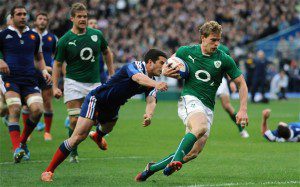
Jonny Sexton and Andrew Trimble had scored for the visitors, but Ireland trailed 13-12 at the break after two penalties from Maxime Machenaud and a try for Brice Dulin.
Dramatic though the first half was, it didn’t even begin to prepare anyone for the second period… and those last two minutes were sheer heart attack.
Sexton had scored again, then Dimitri Szarzewski answered soon after, touching down at the base of the posts to set up a finale so tense it deserved an adults-only rating.
And then, with little more than 90 seconds remaining, Damien Chouly went over in the corner. The French portion of Stade de France – and all the French-by-proxy England fans – went wild. Referee Steve Walsh called in the video referee to check the final pass.
It was forward.
Just.
At this time, in this place, it was a great call by the referee. Moments later, the Irish scrambled the ball back at the scrum… and then they could celebrate.
They had secured the Six Nations with a win in Paris that must surely go down as one of the greatest in their history, alongside their last here in 2000, when O’Driscoll scored a hat-trick.
It had been far from easy. Mathieu Bastareaud, so often almost completely anonymous in this Six Nations, had a storming game at 13. He battered his way through midfield at will – and later battered his way through Jonny Sexton, emphatically ending the Irishman’s game.
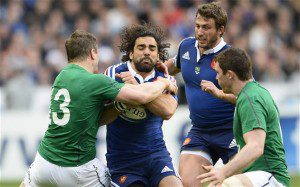
The French were playing to a very different script to the one they had been using all tournament. Where before they had been painfully slow, they were terrifyingly quick; where they had been witless, they were quick-witted; where they had been weak, they were strong; and where they had been almost comical, they were deadly serious.
After Sexton’s second try, set up by O’Driscoll whose old legs no longer have the pace to carry him over the line like they used to, Fields of Athenry rung round the stadium. The Irish faithful thought it was all over.
It wasn’t. Not yet. Not by a long way.
Minutes later, La Marseillaise drowned out the Irish voices as Les Bleus rallied. After Yoann Huget broke into the Irish 22, the French smashed, bashed and crashed inexorably to the line. Somewhere in the heat of all this, Cian Healy knocked Louis Picamoles out cold at a ruck. And still France piled on.
Chouly drove into the padding around the post, and Szarzewski picked up the ball and got it down on the line. Machenuad converted, and so the game was perfectly set for its more tense than tense finish.
Several hours earlier, England had won 52-11 in Rome. On any other day, the seven-try 41-point victory would have been cause for celebration. But they needed their winning margin to be 51 points or more to leave Ireland needing to do more than just win in Paris.
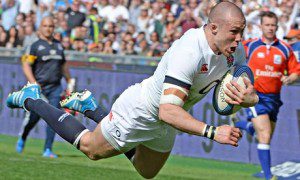
As it was, the size of the Irish task was just the same at the end of England’s Roman holiday as it had been at the start. It was still a tough ask, as later events in Paris proved, but – despite their monster win – England had not succeeded in making the Irish task any more difficult.
But let’s not take too much away from a dominant England win. Two tries for Mike Brown and one each for Owen Farrell, Jack Nowell, Manu Tuilagi, Mako Vunipola and skipper Chris Robshaw blew the hosts away. Farrell converted all seven and added a penalty.
But it wasn’t quite enough. In front of the press, coach Stuart Lancaster was phlegmatic, saying only that he wished his team had scored more points, but back at camp, he’ll no doubt sound out a litany of unnecessary errors as England chased points from the opening minute.
So much for the pundits’ pre-match predictions that they’d secure the game and then play with abandon. This was adventure all the way. When it was good, it was very, very good – but when it went wrong, it was sloppy. In the end, England came up short. But what a way to do it.
Then, Wales hammered Scotland 51-3 under the mysteriously closed roof of the Millennium Stadium.
This fixture regularly supplies a feast of tries – and this one was no exception. But not in the manner anyone had hoped.

The game was over as a contest just 23 minutes into the first half, when Scottish full-back Stuart Hogg was sent off for a nasty, stupid shoulder charge on Dan Biggar. At first, referee Jérôme Garcès brandished a yellow card, but upgraded it to red after seeing replay on the big screen. No video referee required, apparently.
It was an ugly incident, no doubt about it. Hogg may even have deserved the red card, but was Mr Garcès influenced by 75,000 enraged Welsh fans furiously baying for official retribution? A rather dangerous refereeing precedent may just have been set.
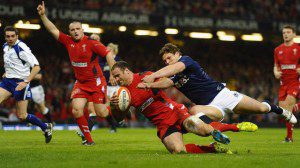
It was 10-3 at the time and the game had been rather nicely balanced. Not any more. Instant overlap every time they got the ball meant Wales could run at will. And they did. The tries flowed – five came in 20 minutes either side of half-time – with both George North and Jamie Roberts claiming their respective second of the game before the second 40 was eight minutes old.
Scottish resistance was futile in a game that, after Hogg’s dismissal, had turned into a turkey shoot. But, resist they did. And in the end they stemmed the flow of points, which is to their credit – but new coach Vern Cotter will have his work cut out when he takes over at the end of the Top 14 season.
The only blip on Wales’s day came when captain Sam Warburton left the field late on with a dislocated shoulder. He looks set to miss the summer tour to South Africa. Leigh Halfpenny, who suffered a similar injury last week against England, has already been ruled out.
Comments? Thoughts? Questions? Let us know. Please also look for and “Like” our Facebook Rugby Wrap Up Page and follow us on Twitter @: RugbyWrapUp, Junoir Blaber, DJ Eberle, Nick Hall, James Harrington, Cody Kuxmann Declan Yeats and Karen Ritter respectively.

